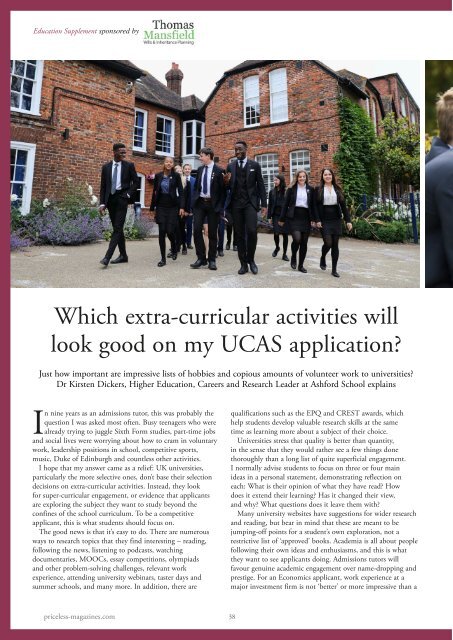Wealden Times | WT230 | July 2021 | Education supplement inside
The lifestyle magazine for Kent & Sussex - Inspirational Interiors, Fabulous Fashion, Delicious Dishes
The lifestyle magazine for Kent & Sussex - Inspirational Interiors, Fabulous Fashion, Delicious Dishes
You also want an ePaper? Increase the reach of your titles
YUMPU automatically turns print PDFs into web optimized ePapers that Google loves.
<strong>Education</strong> Supplement sponsored by<br />
Which extra-curricular activities will<br />
look good on my UCAS application?<br />
Just how important are impressive lists of hobbies and copious amounts of volunteer work to universities?<br />
Dr Kirsten Dickers, Higher <strong>Education</strong>, Careers and Research Leader at Ashford School explains<br />
In nine years as an admissions tutor, this was probably the<br />
question I was asked most often. Busy teenagers who were<br />
already trying to juggle Sixth Form studies, part-time jobs<br />
and social lives were worrying about how to cram in voluntary<br />
work, leadership positions in school, competitive sports,<br />
music, Duke of Edinburgh and countless other activities.<br />
I hope that my answer came as a relief: UK universities,<br />
particularly the more selective ones, don’t base their selection<br />
decisions on extra-curricular activities. Instead, they look<br />
for super-curricular engagement, or evidence that applicants<br />
are exploring the subject they want to study beyond the<br />
confines of the school curriculum. To be a competitive<br />
applicant, this is what students should focus on.<br />
The good news is that it’s easy to do. There are numerous<br />
ways to research topics that they find interesting – reading,<br />
following the news, listening to podcasts, watching<br />
documentaries, MOOCs, essay competitions, olympiads<br />
and other problem-solving challenges, relevant work<br />
experience, attending university webinars, taster days and<br />
summer schools, and many more. In addition, there are<br />
qualifications such as the EPQ and CREST awards, which<br />
help students develop valuable research skills at the same<br />
time as learning more about a subject of their choice.<br />
Universities stress that quality is better than quantity,<br />
in the sense that they would rather see a few things done<br />
thoroughly than a long list of quite superficial engagement.<br />
I normally advise students to focus on three or four main<br />
ideas in a personal statement, demonstrating reflection on<br />
each: What is their opinion of what they have read? How<br />
does it extend their learning? Has it changed their view,<br />
and why? What questions does it leave them with?<br />
Many university websites have suggestions for wider research<br />
and reading, but bear in mind that these are meant to be<br />
jumping-off points for a student’s own exploration, not a<br />
restrictive list of ‘approved’ books. Academia is all about people<br />
following their own ideas and enthusiasms, and this is what<br />
they want to see applicants doing. Admissions tutors will<br />
favour genuine academic engagement over name-dropping and<br />
prestige. For an Economics applicant, work experience at a<br />
major investment firm is not ‘better’ or more impressive than a<br />
priceless-magazines.com<br />
38


















